Episode 444: Ingrid Koivukangas of Alchemy Farm Flowers on diversifying into agrotourism, and our first ASCFG leadership guest, Erin McMullen of Rain Drop Farms
March 11th, 2020
Podcast: Play in new window | Download
Subscribe: Apple Podcasts | Podcast Index | RSS | More
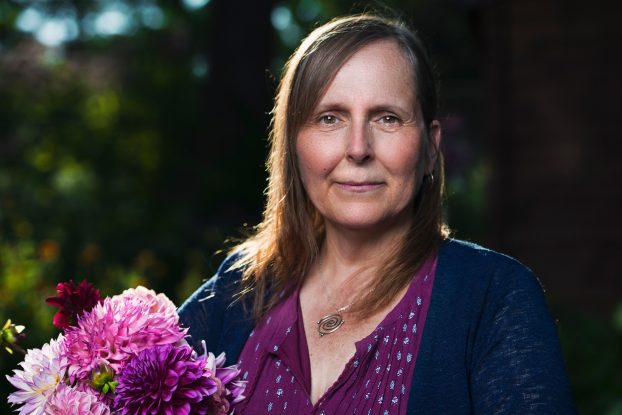
Today’s first guest has been on my “wish list” for a few years, basically since she joined Slow Flowers and I became familiar with her business Alchemy Farm Flowers. I’m so happy today to introduce you to Ingrid Koivukangas, environmental artist, flower farmer, floral designer, educator and innovator.
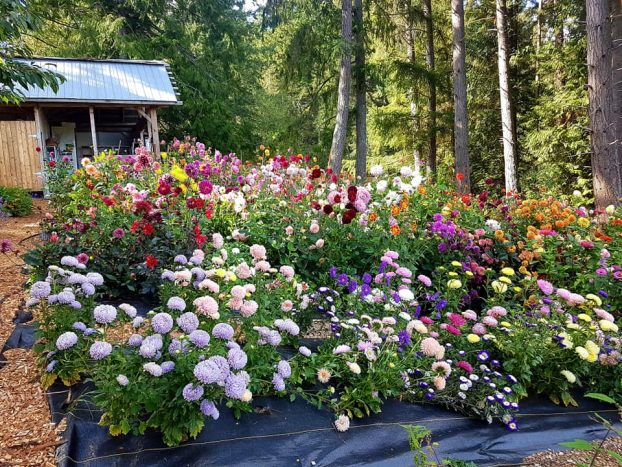
As you will hear in our conversation, Alchemy Farm Flowers is based on Salt Spring Island in British Columbia, a destination that’s sandwiched between Vancouver Island to the west and the U.S. San Juan Islands to the east. It’s reached via car ferry or float plane and I am mesmerized by the videos and photographs I’ve seen on Salt Spring Tourism‘s web site. Meeting Ingrid “virtually” only makes me more eager to visit her in person.
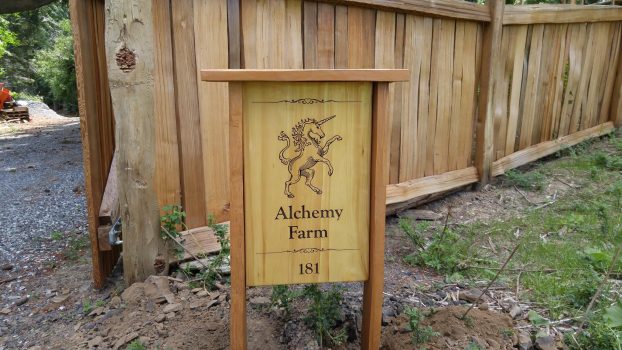
Here’s more about Alchemy Farm and its owner:
Alchemy Farm is situated on ten acres in the beautiful Burgoyne Fulford Valley on Salt Spring Island. The property was once part of the historic 200-acre George and Kate Furness homestead, first settled in the 1880s.
Alchemy Farm is owned by award-winning environmental artist, Ingrid Koivukangas, and Robin Logan, a retired UK Homeopath and woodsmith. Both are creatives, healers and dreamers. The couple married on the Winter Solstice and they believe in love and magic – hence their chosen farm name: Alchemy Farm. Ingrid and Robin’s stewardship of this magical property is rooted in their deep love for the Earth and Nature, of becoming self-sufficient, living in harmony with all beings and providing safe habitat for bees and pollinators.
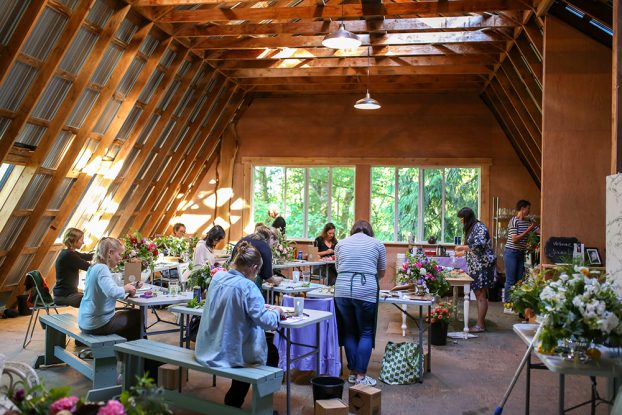
From the Alchemy Farm fields there is a spectacular view of Mount Maxwell towering over the Fulford Valley. Eagles circle overhead. Choruses of frogs serenade from the many ponds. The original hedgerows, planted by early settlers, still mark the boundaries of the property along the eastern and western edges. The orchard is rich with apple, pear, plum and cherry trees. Blackberries drape over decaying fences. The land is awake with potential as its stewards continue to create a sustainable flower farm, an oasis of healing.
The farm produces gorgeous flowers in tune with the seasons, grown without chemicals or pesticides to provide safe homes and food for pollinators—plus flowers for humans to enjoy.
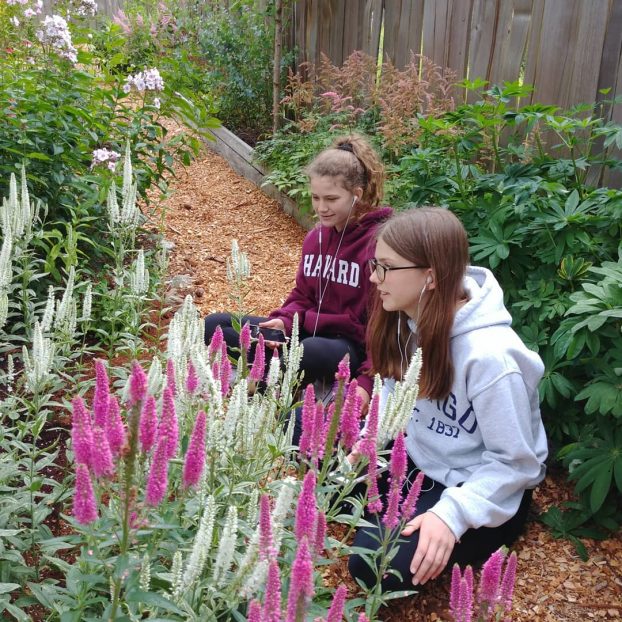
Ingrid teaches flower workshops to businesses, groups and private students, incorporating botanicals harvested directly from her gardens. She created the Alchemy Flower Music Garden Tour as an environmental art exhibit that connects visitors to the music created from the bioenergy of flowers! It’s a magical experience. Those who visit the seasonal Farm Stand can shop for flowers, jams, fruits and veggies, from May to September. Alchemy Farm’s online shop offers dahlia tubers, seeds and other products.
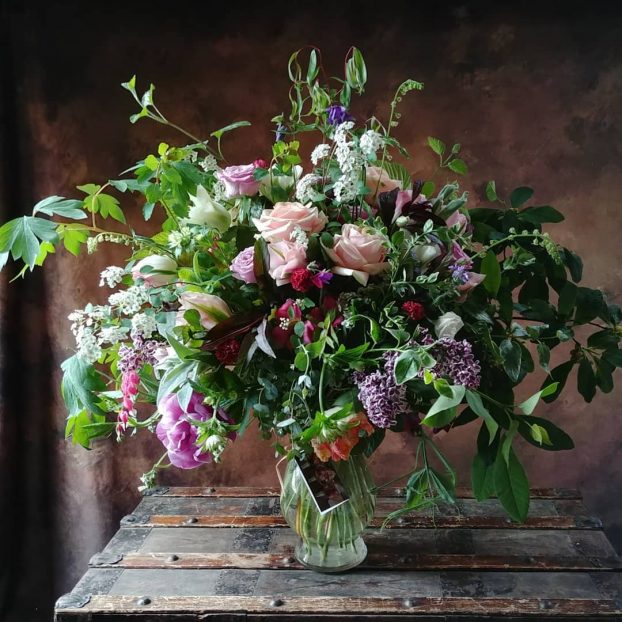
Find and follow Alchemy Farm at these social place:
Alchemy Farm Flowers on Facebook
Alchemy Farm Flowers on Instagram
Alchemy Farm Flowers’ new Bee Garden School

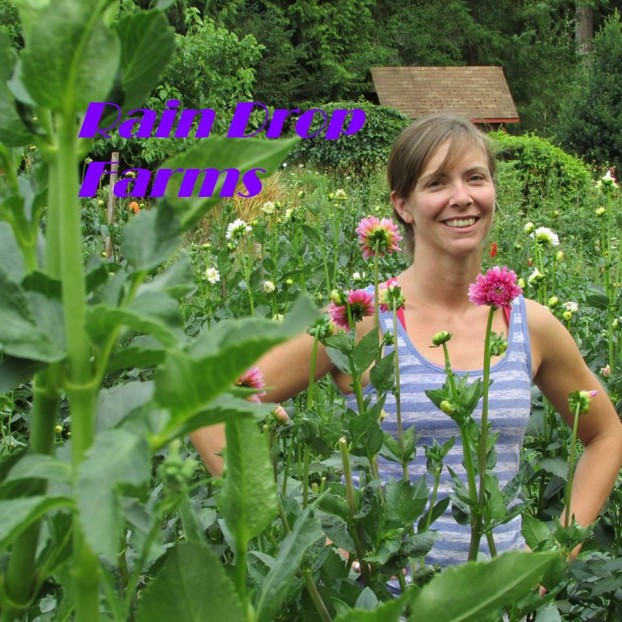
Next up, our first interview with one of seven regional directors who are part of the ASCFG leadership — we’ll be recording conversations with all of these folks throughout the coming year. I hope to record as many as possible in person, but we’ll have to see how and where my travels in 2020 take me.
Please meet return guest Erin McMullen of Rain Drop Farms. Erin and her husband Aaron Gaskey are veteran flower farmers in Philomath, Oregon, near Corvallis. Rain Drop Farms was established in 1999 on a one acre plot in their backyard. They had every intention of growing vegetables, and threw in a few dahlia tubers that grandma gave them. Later, after a long search, Erin and Aaron were finally able to purchase their own piece of paradise and move to the farm’s current location, at the base of Oregon’s Mary’s Peak.
Those dahlia tubers made the move with them and before long they had more flowers than potatoes and the beginning of a dream. Rain Drop Farm grows flowers in a way that benefits not only flower-loving customers, but also their natural neighbors. This means avoiding using harsh chemicals or insecticides and opting for natural and organic solutions to any pest problems. This all supports their belief that the flowers that grace our tables should be as healthy as the food we feed our bodies.
Erin is entering her second year as the West & Northwest regional director, representing the Association of Specialty Cut Flower Growers in Alaska, California, Hawaii, Idaho, Nevada, Oregon, and Washington.
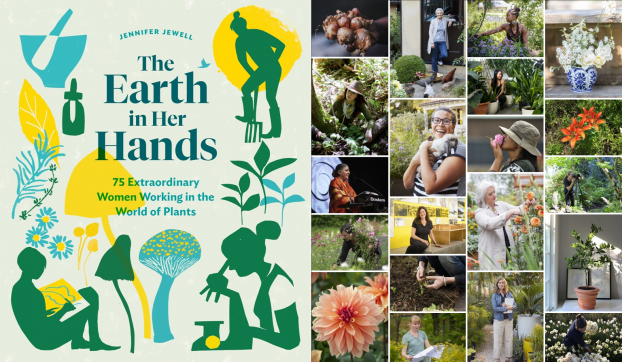
Before we wrap up, I want to announce the winner of last week’s book giveaway. Last week you heard from Jennifer Jewell, author of the new book, The Earth in Her Hands – 75 extraordinary women working in the world of plants and host of the NPR program Cultivating Place. I am so honored to be included in this book, and last week you heard me as part of Jennifer’s panel at the NW Flower & Garden Festival, where I appeared with two other women featured in its pages: Christin Geall and Lorene Edwards Forkner.
Our book giveaway comes thanks to Jennifer’s publisher Timber Press. Last week, we asked listeners to post a comment about an extraordinary woman who influenced their plant journey. Thank you to all who took the time to comment on our show notes at debraprinzing.com and on Instagram’s @myslowflowers In a random drawing last Sunday, March 8th, I selected the winner: Catharine McCord!
Catherine posted a comment celebrating her friend Shelley who can be found on IG as @artemisiaandrue, as an incredible mentor, herbalist, teacher, and friend, writing: “Shelley has introduced me to many plants, spiritually and medicinally. My life is forever changed as I share this knowledge on how plants can be our emotional, spiritual, and nourishing allies.“
Congratulations Catharine — look for a copy of The Earth in Her Hands coming to you soon!


The Slow Flowers Summit takes place in just four months and you’re invited to join the uplifting experience that has been called a Floral Mind Meld. Our first two days will be hosted at Filoli Historic House and Garden in Woodside, California, outside the SF Bay Area, where we will gather on days one and two — June 28-29th. On day three, June 30th, we will enjoy a special tour of Farmgirl Flowers’ headquarters in San Francisco, hosted by our friend and past Slow Flowers Summit keynote speaker, Christina Stembel. All in all, it will be special and exclusive — and I can’t wait for you to join us!
Many of you have been asking about lodging – and I’m happy to announce that our event manager Karen Thornton has just posted details about room blocks under the Travel & Accommodations tab at Slowflowerssummit.com.
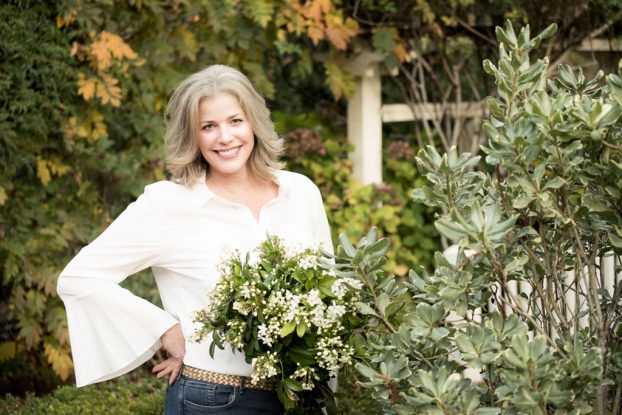
We’ve also included details about a special, limited, pre-Summit opportunity that’s just been announced. Our co-host Teresa Sabankaya of Bonny Doon Garden Co. in Santa Cruz, and her husband Nezih Sabankaya, are throwing a Speaker Dinner in their private gardens in the Santa Cruz Mountains. The dinner will take place on Saturday, June 27th, the night before the Summit begins, and it is separately priced. The seating is limited, so if you’re interested, follow the link at the Summit website.
It promises to be an intimate evening for anyone who travels to the area early and wants to connect with fellow attendees and speakers. Thank you, Teresa and Nezih Sabankaya for creating this lovely opportunity.
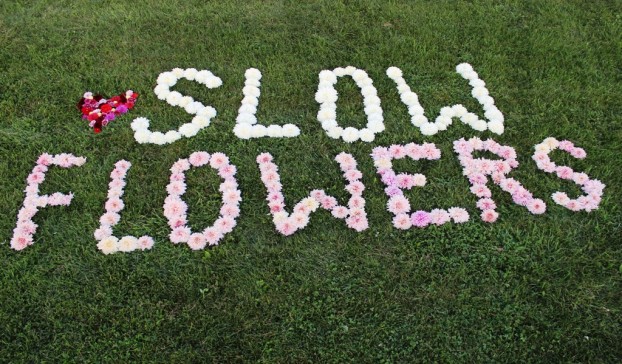
The Slow Flowers Podcast has been downloaded more than 586,000 times by listeners like you. Thank you for listening, commenting and sharing – it means so much.
As our movement gains more supporters and more passionate participants who believe in the importance of the American cut flower industry, the momentum is contagious. I know you feel it, too. I value your support and invite you to show your thanks and with a donation to support my ongoing advocacy, education and outreach activities. You can find the donate button in the column to the right.
Thank you to our sponsors
Florists’ Review magazine. I’m delighted to serve as Contributing Editor for Slow Flowers Journal, found in the pages of Florists’ Review. It’s the leading trade magazine in the floral industry and the only independent periodical for the retail, wholesale and supplier market. Take advantage of the special subscription offer for members of the Slow Flowers Community.
FarmersWeb. FarmersWeb software makes it simple for flower farms to streamline working with their buyers. By lessening the administrative load and increasing efficiency, FarmersWeb helps your farm save time, reduce errors, and work with more buyers overall. Learn more at www.farmersweb.com
Syndicate Sales, an American manufacturer of vases and accessories for the professional florist. Look for the American Flag Icon to find Syndicate’s USA-made products and join the Syndicate Stars loyalty program at syndicatesales.com.
Longfield Gardens, which provides home gardeners with high quality flower bulbs and perennials. Their online store offers plants for every region and every season, from tulips and daffodils to dahlias, caladiums and amaryllis. Check out the full catalog at Longfield Gardens at longfield-gardens.com.
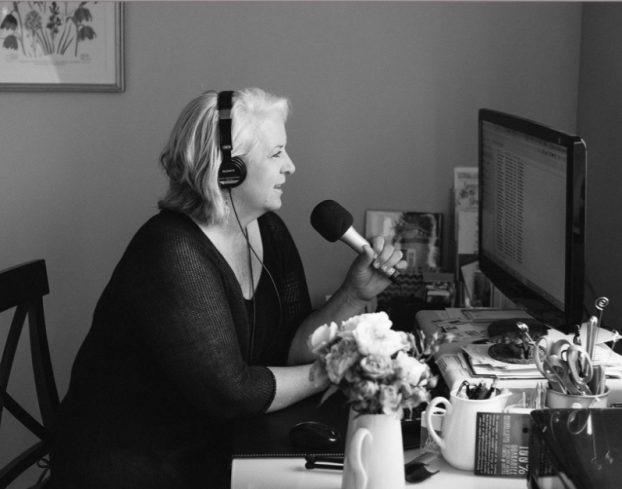
I’m Debra Prinzing, host and producer of the Slow Flowers Podcast. Next week, you’re invited to join me in putting more American grown flowers on the table, one vase at a time. And If you like what you hear, please consider logging onto iTunes and posting a listener review.
The content and opinions expressed here are either mine alone or those of my guests alone, independent of any podcast sponsor or other person, company or organization.
The Slow Flowers Podcast is engineered and edited by Andrew Brenlan. Learn more about his work at soundbodymovement.com.
Music Credits:
Castor Wheel Pivot; Alustrat; Great Great Lengths; Gaena; Glass Beads
by Blue Dot Sessions
http://www.sessions.blue
Lovely by Tryad
http://tryad.bandcamp.com/album/instrumentals
http://creativecommons.org/licenses/by-sa/3.0/
In The Field
audionautix.com








